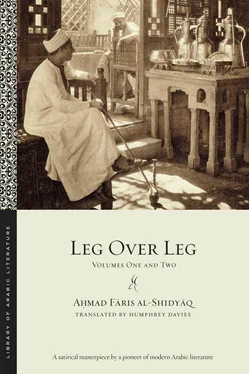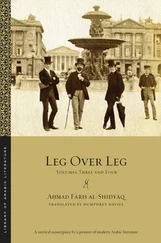218 māghūṣ : a nonce-word apparently used to mean “bore, pest.”
219“Faid al-Hāwif ibn Hifām in lifping tones” ( ḥaddasa l-Hāris ibn al-Hithām ): the author substitutes the letter s for th, h for ḥ , and th for sh ; without these substitutions, the sentence would read ḥaddatha l-Ḥārith ibn Hishām . The name evokes those of the narrators of the best known maqāmāt series, by al-Hamadhānī, whose narrator is called ʿĪsā ibn Hishām, and those by al-Ḥarīrī, who names his narrator al-Ḥārith ibn Hammām. At the same time, the name in its “lisped” form may be translated as “Masher, son of Pulverizer.”
220 The Balancing of the Two States and Comparing of the Two Straits ( Kitāb Muwāzanat al-ḥālatayn wa-murāzanat al-ālatayn ): the title may be intended to evoke the Kitāb al-Muwāzanah bayna Abī Tammām wa-l-Buḥturī of al-Āmidī (see 1.1.11 above), although the latter compares not good and evil but the literary accomplishments of two poets and does not employ the “facing tables using a columnar system” referred to below.
221Abū Rushd “Brains” ibn Ḥazm (Abū Rushd Nuhyah ibn Ḥazm): the name evokes two of the best known writers of the Maghreb — Ibn Rushd, known in the West as Averroës (520–95/1126–98), and Ibn Ḥazm (384–456/994–1064) — although the significance of the choice of these writers is not obvious. Nuhyah , literally “mind,” is not part of the name of either writer.
222“by even a jot” ( naqīran ): an echo of Q Nisāʾ 4:53 and 124.
223“those who hold to the humoral theory” ( al-ṭabāʾiʿiyyīn ): i.e., those who hold to Galen’s theory that one’s physical state is determined by the balance therein of the humors ( al-ṭabāʾiʿ —phlegm, blood, yellow bile, and black bile).
224“by insisting on the impossible and making from the non-existent something necessarily existent” ( bi-farḍ al-mustaḥīl wa-jaʿl al-maʿdūm ka-l-mawjūd al-wājib ): the terms “(im)possible” and “necessary” pertain to Aristotelian logic (see also above 1.6.4, n. 159) and were introduced into Islamic philosophy by al-Fārābī (ca. 259–339/872–950). Al-Fārābī postulated that it is inconceivable to posit the impossible (e.g., a square circle), while the author’s jurisprudent insists that to do so constitutes the very essence of his trade.
225“I added him then to the three, making him number four” ( fa-ṣayyartuhu rābiʿa l-thalāthah ): an echo of Q Kahf 18:22 sa-yaqūlūna thalāthatun rābiʿuhum kalbuhum “Some will say, ‘They were three, the fourth was their dog’” (in reference to “the people of the cave”).
226“mindful men” ( dhī ḥijrin ): an echo of Q Fajr 89:5.
227“A Sacrament” ( Sirr ): the allusion may be either to the sacrament of confession (1.14.4) or to the secret (also sirr ) referred to at the end of the chapter (1.14.9).
228“its number”: i.e., the number thirteen.
229“seized by their forelocks” ( yuʾkhadhu bi-l-nawāṣī ): Q Aḥzāb 33:37.
230“the ‘buttocks’ of ‘Halt and weep’” ( aʿjāz qifā nabki ): qifā nabki (“Halt and weep”) are the opening words of the celebrated “suspended ode” ( muʿallaqah ) of the pre-Islamic poet Imruʾ al-Qays; the word “buttocks” occurs later, when the poet says “I said to the night, when it stretched its lazy loins followed by its fat buttocks, and heaved off its fat breast, ‘Well now, you tedious night, won’t you clear yourself off, and let dawn shine?’” (Arthur J. Arberry, The Seven Odes: The First Chapter in Arabic Literature (London: George Allen and Unwin, 1957), 64). The author links, bathetically, the misfortunes of the speaker with those of one of Arabic literature’s most heroic figures.
231 karshūnī : Arabic written in Syriac script.
232“soul ( nafs )… breath ( nafas )… breathes ( yatanaffas )”: the author plays with the fact that the words for “breath” and “soul” are spelled the same when vowels are not indicated, with a resulting potential for confusion; the reference to orifices and “a certain school” may be no more than a joke to the effect that some people count farting, belching, hiccupping, etc. as “points of exit and entry” for the breath.
233“open his wife’s womb”: see, e.g., Gen. 30:22: “And God remembered Rachel, and God hearkened to her, and opened her womb.”
234“long converse and closeness in bed ” ( qurb al-wisād wa-ṭūl al-siwād —literally, “closeness of pillow and length of converse”): Bint al-Khuss (a semi-legendary figure dating to perhaps the third century before Islam and famed for her ready wit) was asked, “Wherefore didst thou commit fornication?” and this phrase was her response (Lane, Lexicon , s.v. sāwada ; al-Maydānī, Majmaʿ , 2:37).
235“the two c s”: in the Arabic, “the two k s” ( al-kāfayn ). Since there appears to be no conventionally recognized “two k s,” the meaning is open to speculation. In the opinion of the translator, the phrase is probably code for al-kuss wa-l-kutshīnah (“cunt and cards”), the topics of this chapter.
236The following catalog lists activities, such as gambling, dishonest dealing, speculation, and usury that are forbidden in Islam.
237“such people”: meaning presumably, and presumably ironically, ships’ captains.
238 irtisām …: the following list of 104 words is, in effect, redundant, because all but fifteen of them are repeated, with definitions, in a table at the end of the chapter (1.16.9 ff.); on the author’s evolving approach to the formatting of such lists, see the Translator’s After-word in Volume Four. Words that are not repeated in the table, and that thus remain unglossed, are tashāʾum, taṭayyur, tafāʾul, taḥattum, tayammun, tasaʿʿud, tamassuḥ, kahānah, intijāʾ, ṭalāsim, ʿazāʾim, ruqā, tamāʾim, ʿūdhah , and siḥr ; these items are glossed here, in the end-notes. Presumably the author did not regard them as rare enough to need definition.
239 tashāʾum : “to draw an evil omen.”
240 taṭayyur : “to draw auguries.”
241 tafāʾul : “to draw a good omen.”
242 taḥattum : “to believe in the inevitability of a thing.”
243 tayammun : “to draw a good omen.”
244 tasaʿʿud : “to draw a good omen.”
245 tamassuḥ : “to seek blessing from holy men by drawing the hands over them” ( Lisān : “blessing is sought from so-and-so by drawing of the hands [over the object of veneration] ( yutammasaḥu bi-hi ) because of his merit and [the devotedness of] his worship, as if one were drawn closer to God by proximity to him”).
246 ʿāṭis : defined in the list of definitions at the end of the chapter under al-ʿāṭūs , following the Qāmūs .
247“ qaʿīd or dākis ”: defined in the list of definitions at the end of the chapter under the entry for kādis , following the Qāmūs .
248 kahānah : “soothsaying, divination.”
249 intijāʾ : the author does not include this in his list of definitions below, nor does it appear in a relevant sense in the dictionaries, but al-intijāʾ is described by some of these as synonymous with al-tanājī , or “talking to one another in secret,” and there may be a reference here to Q Mujādilah 58:9: “O believers, when you conspire ( idhā tanājaytum ), conspire not together in sin and enmity and in disobedience to the Messenger, but conspire together in peace and God-fearing” (58:9; Arthur J. Arberry, The Koran Interpreted (Oxford: Oxford University Press, 1982), 570); see also tanajjā above and in the list of definitions.
Читать дальше












